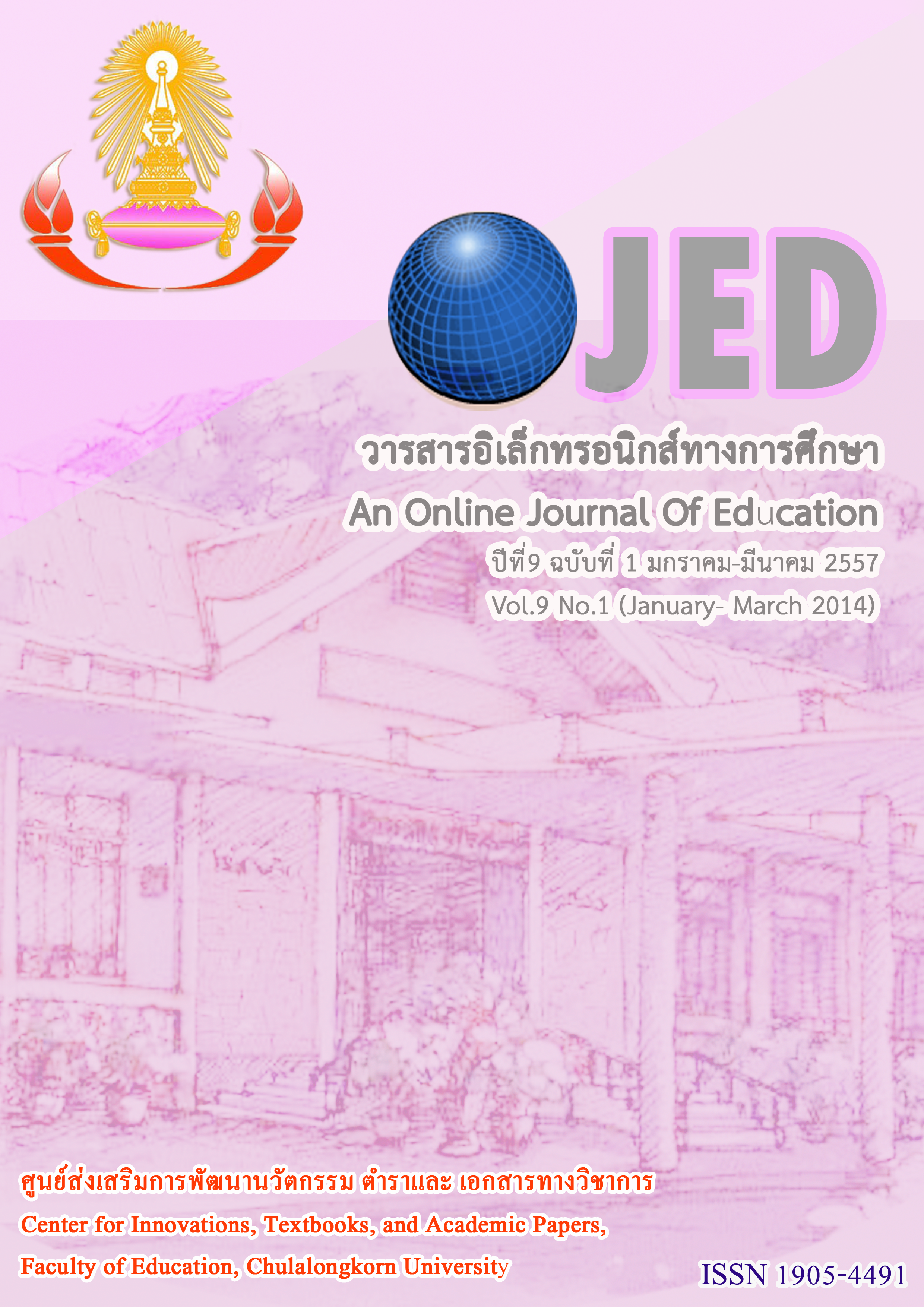บทบาทของผู้ปกครองในการส่งเสริมทักษะชีวิตของเด็กวัยอนุบาล PARENTS' ROLE IN PROMOTING LIFE SKILLS OF PRESCHOOLERS
Keywords:
บทบาทของผู้ปกครอง, การส่งเสริมทักษะชีวิต, เด็กวัยอนุบาล, PARENTS' ROLE, PROMOTING LIFE SKILLS, PRESCHOOLERSAbstract
การวิจัยครั้งนี้มีวัตถุประสงคเพื่อศึกษาบทบาทของผู้ปกครองในการสงเสริมทักษะชีวิตของเด็กวัยอนุบาลใน 3 ดาน ไดแก ด้านการสนับสนุนให้เด็กทำกิจกรรมร่วมกับผู้อื่น ด้านการส่งเสริมให้เด็กค้นพบและสร้างองค์ความรู้ด้วยตนเอง และด้านการเปิดโอกาสให้เด็กทำสิ่งต่างๆด้วยตนเอง ประชากร คือ ผูปกครองของเด็กชั้นอนุบาลปที่ 3 ที่กําลังศึกษาในโรงเรียนอนุบาลจุติพร สังกัดสำนักงานเขตพื้นที่การศึกษาประถมศึกษานนทบุรี เขต 2 จังหวัดนนทบุรี ภาคการศึกษาปลาย ปการศึกษา 2556 จำนวน 74 คน เครื่องมือที่ใช้ในการวิจัย คือ แบบสอบถาม และแบบสัมภาษณ์ วิเคราะหขอมูลโดยการหาค่าร้อยละ ค่าเฉลี่ย ส่วนเบี่ยงเบนมาตรฐาน และการวิเคราะห์เนื้อหา
ผลการวิจัยมีดังนี้ ผู้ปกครองมีบทบาทในการส่งเสริมทักษะชีวิตของเด็กวัยอนุบาล โดยภาพรวมอยู่ในระดับปฏิบัติมาก (=4.07) ด้านที่มีค่าเฉลี่ยสูงที่สุด คือ ด้านการสนับสนุนให้เด็กทำกิจกรรมร่วมกับผู้อื่น (=4.48) รองลงมา คือ ด้านการส่งเสริมให้เด็กค้นพบและสร้างองค์ความรู้ด้วยตนเอง (=4.31) และด้านการเปิดโอกาสให้เด็กทำสิ่งต่างๆ ด้วยตนเอง (=3.42) ตามลําดับ
The purpose of this research was to study parents’ role in promoting life skills of preschoolers in 3 aspects: Supporting children to participate with other, Encouraging children to discover and create knowledge, and Enhancing children to doing things by themselves. The populations were 74 parents of level 3 preschoolers who study at Jutiporn Kindergarten under Nonthaburi Primary Educational Service Area Office 2 in the second semester of the 2013 academic year. The research instruments were a questionnaire form and an interviewing form. The data were analyzed using percentage, means, standard deviation, and content analysis.
The research findings found from the performance of parents in promoting preschoolers life skills all 3 aspects were in the high level(= 4.07). Considering to parents' role in supporting children to participate with other was the highest level (=4.48), encouraging children to discover and create a knowledge (=4.31) and enhancing children to doing things by themselves (-3.42), respectively.




